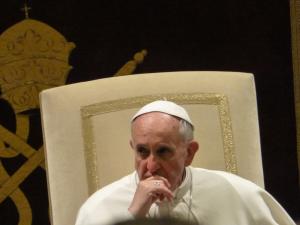
As the results of various elections indicate, right-wing nationalists are slowly rising in power in Europe. In the United Kingdom’s European elections, the Brexit Party, led by hard-liner Nigel Farage, garnished the most votes of a single party, while in Italy, Lega Nord, the far-right “league” party headed by Matteo Salvini came out on top. These nationalists often give rise to dangerous rhetoric against outsiders, with Muslims often on the receiving end of unjust bigotry. The rise of far-right nationalism in Europe should trouble everyone. Why are people attracted to it? There are many reasons; nonetheless, it should not be surprising that a part of it is the combination of a romanticism of the past combined with fears that outsiders are causing harm to society at large: outsiders are used as scapegoats by those who seek power and control. It should be noted, however, that such nationalism, far from promoting Europe and its traditions, rather undermines the heritage and legacy of Europe and the lessons Europe learned in the past century. It can be said that an evil spirit, once thought exorcised from Europe, has returned with a vengeance.
It is in the midst of this crisis that Pope Francis issued important words for the world for his Message for the 2019 World Day of Migrants and Refugees. Hatred, fear, individualism, lack of compassion and solidarity with others, indeed, a blatant disregard for the plight of the needy, are at the core of a dangerous so-called populist movement. Pope Francis made his statements in part, to address these problems, speaking like a prophet against an ideology which threatens the world.
As Pope Francis spoke as a Christian, indeed, as the head of the Catholic communion of churches, it should not be surprising that what lies behind his message are the words and deeds of Jesus Christ. Hopefully, despite coming from a different religious tradition, non-Christians will find much value to his words and work with Christians to combat an insidious inhumane ideology that will lead to hell on earth if its goals were attained.
Thus, Pope Francis said that when we see migrants and refugees around us, we must not be afraid. We must see it as an opportunity to truly become the best of what we could be instead of following our worst inclinations:
“Take courage, it is I, do not be afraid!” (Mt 14:27). It is not just about migrants: it is also about our fears. The signs of meanness we see around us heighten “our fear of ‘the other’, the unknown, the marginalized, the foreigner… We see this today in particular, faced with the arrival of migrants and refugees knocking on our door in search of protection, security and a better future.[1]
Those who already have wealth and resources often are led to fear those who do not possess them. They fear that not only will society take from them, but society will take all that they have, so that those who have and those who have not will be switched around. Those in need are seen as an existential threat. As a result, many respond to those in need with extreme cruelty:
“See that you do not despise one of these little ones, for I say to you that their angels in heaven always look upon the face of my heavenly Father” (Mt 18:10). It is not just about migrants: it is a question of seeing that no one is excluded. Today’s world is increasingly becoming more elitist and cruel towards the excluded.[2]
This, in some ways, is “the logic of the world.” Many follow some form of Social Darwinism, saying it is a dog-eat-dog world, and one either stays on top by pushing everyone else away, doing whatever it takes to stay on top, or one finds themselves becoming dispossessed of all things and trampled upon by those in need. This logic, of course, is fundamentally flawed, because it leads to the destruction of all things: only by working together and trying to preserve the good together can we all find that peace and safety, that contentment, which we seek. Pope Francis, therefore, explained that Christ came to overcome this mentality, to show us the better way:
Jesus Christ asks us not to yield to the logic of the world, which justifies injustice to others for my own gain or that of my group. “Me first, and then the others!” Instead, the true motto of the Christian is, “The last shall be first!” “An individualistic spirit is fertile soil for the growth of that kind of indifference towards our neighbours which leads to viewing them in purely economic terms, to a lack of concern for their humanity, and ultimately to feelings of fear and cynicism. Are these not the attitudes we often adopt towards the poor, the marginalized and the ‘least’ of society?[3]
Christians are called out of their individualism by being told to love their neighbor, to do good for the sake of all: that is, to embrace the common good. When someone is needy, we have to make sure those needs are properly and justly treated. If someone is wounded, we must help them be healed. “As Jesus himself teaches us (cf. Mt9:35-36; 14:13-14; 15:32-37), being compassionate means recognizing the suffering of the other and taking immediate action to soothe, heal and save.”[4] This is true for all, not just the migrants. This is why Pope Francis constantly said in his message that what he was speaking about was not just about migrants. It is about us. It is about how we treat those in need, how we look upon them. Do we project our demons upon others, thereby showing the world how monstrous we are?
Likewise, the concern is not just about migrants, but about all those in need, how we should treat anyone who is in need. When we justify abuses against one marginalized group, we begin the process of dehumanization which allows us to mistreat others, until all but the elite are maligned, with the degradation and abuse of all people in need, wherever they are, being the final result. Pope Francis, therefore, offered four verbs which he said should be the foundation by which we treat not only migrants but all those maligned and abused by being in the peripheries of society:
Dear brothers and sisters, our response to the challenges posed by contemporary migration can be summed up in four verbs: welcome, protect, promote and integrate. Yet these verbs do not apply only to migrants and refugees. They describe the Church’s mission to all those living in the existential peripheries, who need to be welcomed, protected, promoted and integrated.[5]
It has always been understood that the Christian faith looks to the lowest among us and promotes them; there really is a preferential option for the poor (and vulnerable) within Scripture. Expressing this point, St. Cyril of Alexandra said: “And Christ receives from the world, not by any means those who are honored by it or valued among men, bur rather he receives as many that are considered of low estate among them and those of less repute.”[6] Those who look to preserve what they have at the expense of others will find they will lose everything. We are called to work together with our neighbor, seeing that we are in this together, and this is the way we find ourselves moving heavenward, as St. Basil the Great stated: “He wishes us to cling to our neighbors with embraces of charity like tendrils of a vine, and to rest upon them, so that keeping our desires always heavenward, we may, like certain climbing vines, reach the upmost heights of the loftiest teachings.”[7]
The message of Pope Francis is the message of the church since its foundation. Social justice has always been a part of the Gospel proclamation. It is, to be sure, inherent within many other religious traditions, and in many secular traditions as well, which is how and why the words of Pope Francis should be heeded not just by Christians, but by all those of good will, looking for and hoping for a better future. The lessons of the past century should tell us the terrible road which is before us if the world continues to embrace the siren call of nationalism. Sadly, even those who fought against it in the past did not often do so with the best intentions and so, it was foreseeable that the fires of nationalism could rise again if they were not properly put out. If we do not stop the hate now, it is frightening to consider what the world will look like in a few years.
[1] Pope Francis, “Pope’s Message for 2019 World Day of Migrants and Refugees” (https://www.vaticannews.va/en/pope/news/2019-05/pope-francis-message-world-day-migrants-refugees-full-text.html).
[2]Ibid.
[3] Ibid.
[4] Ibid
[5] Ibid.
[6] St. Cyril of Alexandria, Glaphyra on the Pentateuch. Volume I: Genesis. Trans. Nicholas P. Lunn (Washington, DC: CUA Press, 2018), 232.
[7] St. Basil the Great, “Hexaemeron” in Saint Basil: Exegetic Homilies. Trans. Agnes Clare Way, CDP (Washington, DC: CUA Press, 1963), 76.
Stay in touch! Like A Little Bit of Nothing on Facebook.
If you have liked what you read, please consider sharing it with your friends and family!













